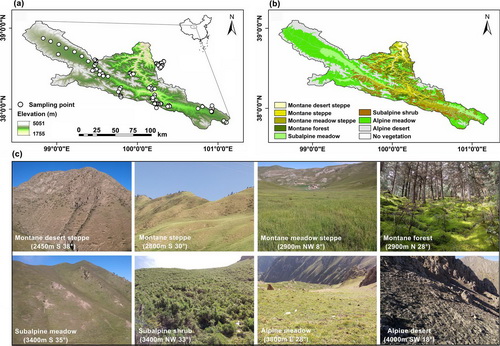The Stock of Soil Organic Carbon in Semiarid Alpine Regions Estimated
Updatetime:2019-04-08From:
【Enlarge】【Reduce】
Organic carbon in soils is about two times larger than that present in the atmosphere. Thus, soil organic carbon (SOC) is one of the important souce of global greenhouse gases.
SOC in alpine regions is characterized by a strong local heterogeneity, which may contribute to relatively large uncertainties in regional SOC stock estimation.
Besides, the patterns, stock, and environmental controls of SOC in semiarid alpine regions are still less understood. Therefore, the purpose of this study is to comprehensively quantify the stock and controls of SOC in semiarid alpine regions.
Recently, scientists from Northwest Institute of Eco-Environment and Resources of CAS, together with their colleague from University of Southern Queensland, applied a classical statistical model and a machine learning technique to estimate the SOC stock in the study area.
In this study, scientists further quantifies the environmental controls of SOC based on a general linear model (GLM) couple with the structural equation modeling (SEM).
The study indicates the SOC is more accurately estimated by a random forest compared to a multiple linear regression model, with a total stock of 219.33 Tg C and an average density of 21.25 kg C m-2 at 0-60 cm across the study area.
The study also shows the higher SOC density appears to highlight the importance of soils in alpine regions in terms of the balance of regional carbon cycle.
The results of this study highlight the presence of high stocks of organic carbon in soils of semiarid alpine regions, indicating a fundamental role played by topography in affecting the overall SOC, which is mainly attained through its effects on the mean annual temperature.
The study entitled “Soil organic carbon in semiarid alpine regions: the spatial distribution, stock estimation, and environmental controls” was published in Journal of Soils and Sediments.

Distribution of sampling sites across the Yinghuoxia basin in the Qilian Mountains, northwestern China (Image by FENG Qi)
Contact:
FENG Qi
E-mail: qifeng@lzb.ac.cn
Key Laboratory of Ecohydrology of Inland River Basin, Northwest Institute of Eco-Environment and Resources, Chinese Academy of Sciences, Lanzhou 730000, China.
Appendix




